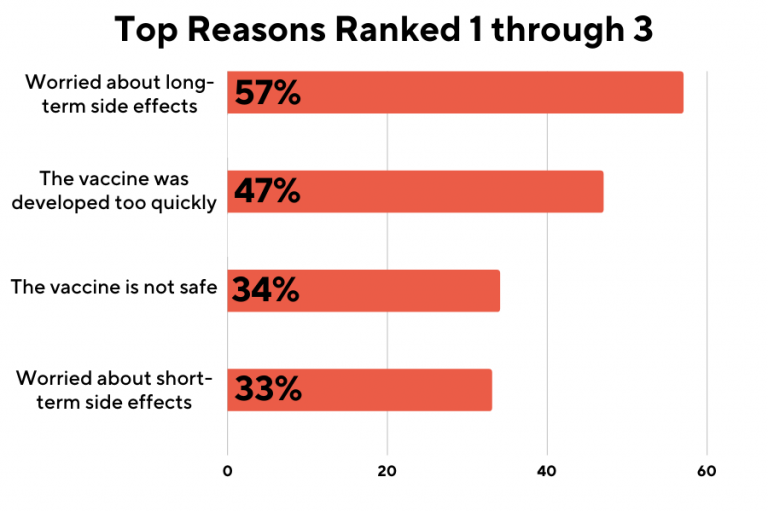PORTLAND, Ore. (KOIN) — As COVID-19 cases continue to rise and vaccine rates linger at a plateau, a new statewide study is shining some light on who is getting vaccinated, who isn’t, and why?
Over 1,400 Oregonians shared their vaccination status — and their concerns — in a recent poll conducted by the Oregon Values and Beliefs Center.
The study, which concluded July 14, reported 67% of adults to be fully vaccinated. This data matched vaccine rates recorded by the Oregon Health Authority at that time.
According to the poll, older Oregonians were much more likely to be vaccinated, with 91% of those 75 and older reporting full vaccination status. The study shows Oregonians age 30-44 were the least likely to have received a vaccine, with only 52% stating they had been vaccinated. Fifty-six percent of residents between the ages of 18 and 29 were vaccinated.
“I think they’re are a lot of assumptions about the reasons people have for not getting vaccinated,” Associate Executive Director for the Oregon Values and Beliefs Center, Amaury Vogel Told KOIN 6 News. “I think it’s better to hear directly from them what their reasons are as to why they’re not getting vaccinated.”

According to the study, most unvaccinated residents cited safety concerns as their primary reason for not getting the shot.
“People’s top concerns are side effects, how quickly the vaccine was developed and that it’s not safe,” stated Vogel. “So, if we know those are the reasons people are not getting vaccinated we can do education around that and address those concerns … Because now those people are kind of in danger.”
The largest disparity in vaccine rates appeared to be determined mainly by social and political ideologies, geographical location and education levels. Vogel told KOIN 6 News this data was ‘fairly on trend’ with national polls on the issue.
Residents who identified as social conservatives were four times less likely to report having been vaccinated than their socially liberal counterparts. And only 47% of Oregonians with a high school diploma or less reported having at least one dose, as compared to 90% of those reported with a four-year degree or more.
BIPOC residents were also less likely to have been vaccinated than white residents (59% vs. 68%). Though it appears gender had no influence on vaccination status nor reasoning for vaccine hesitancy.
According to the study, among those unvaccinated only 18% of residents reported they were “likely” to get the vaccine. “Most people who are not vaccinated already say they are not likely to get vaccinated,” said Vogel. “In fact 60% of those who are unvaccinated say they are ‘not at all likely’ to get vaccinated.”
Vogel made a point to add that the study was concluded in mid-July, before the resurgence of COVID cases. Vogel told KOIN 6 she hopes the results from their research may help educate those who are vaccine-hesitant while allowing their concerns to be heard and addressed.
“When we did this study vaccination was sort of petering out but also cases were very low — we were down to about 100 cases a day … now we’re at about 10 times that,” Vogel said. “So this study helps give us a better understanding of what information people need in order to decide to get vaccinated.”